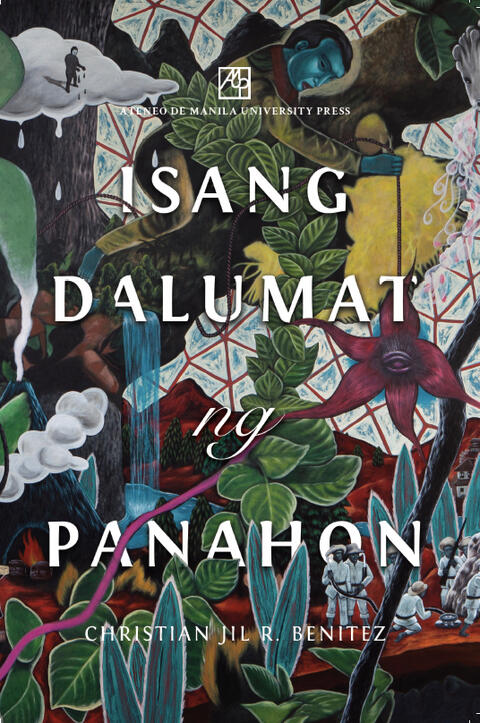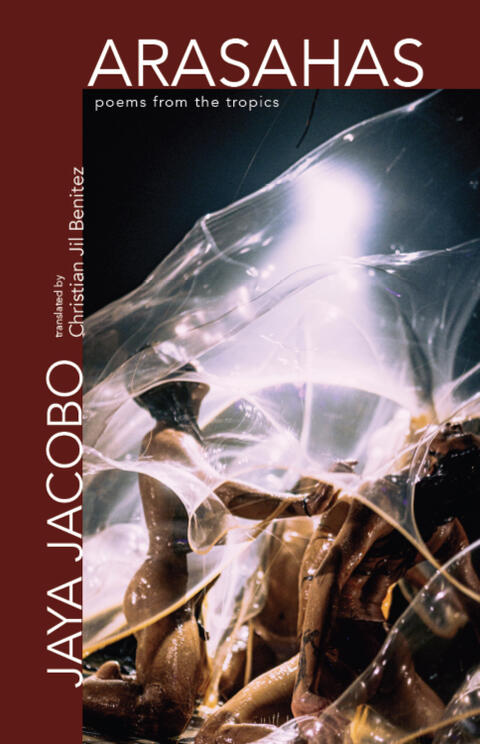
Christian Jil Benitez is a poet, scholar, translator, and educator from the Philippines. He is the author of Isang Dalumat ng Panahon (ADMU Press, 2022) and translator of Arasahas: Poems from the Tropics (PAWA Press and Paloma Press, 2024).
About | Works
Panahon | Arasahas | Critical | Creative | Editorial/Review

Isang Dalumat ng Panahon
Ateneo de Manila UP, 2022
Best Book of Literary Criticism/Cultural Studies, 41st Philippine National Book Awards
Isang Dalumat ng Panahon ("A Theory of Time") attempts to articulate a "Filipino" notion of time, through harnessing literature as its object and method, turning to a wide range of texts, from precolonial folk poetry and colonial dictionary entries, to contemporary Philippine scholarship and journalistic writings. What emerges thus is a vernacular intuition of time as panahon, or the opportunity for things to become. This idea is further pursued through exploring related concepts such as the mythic and the bountiful; the materiality and arrival of things; trope and tropicality; contemporaneity and history; and love and metaphor. In doing so, the book demonstrates a new vocabulary for temporality as it is specifically embodied in the Philippine world.
Order the Book
ADMU Press | Lazada PH | Shopee PH | Alkem
Praise
What Benitez offers is a valuable text on time... with exceptional attention, patience, and embrace to the Filipino worldview that is rooted in indigenous and mythological sensibilities. Here lies the hope that in the midst of present instability of ideas and systems of thinking, some virtues still hold and remain certain.
— Alvin Yapan, author of Worship the Body and Ang Bisa ng Pag-uulit sa Katutubong PanitikanIsang Dalumat ng Panahon is an incisive theoretical discourse on time through literature... Exceeding simple translation of or borrowing from phenomenological studies on temporality, Benitez opens a clear contribution: how to identify and practice such a study in the particular ecology that is the Philippines...
— Gary C. Devilles, author of Sensing ManilaIn this book, Benitez creates a "language of his own," with an exceptional style on discourse, that can only be idiolectical: the sign of emergence of a true theorist and critic!
—Oscar V. Campomanes, co-editor of Colonialism & Modernity: Re-mapping Philippine HistoriesBetween these pages is a careful attentiveness to the theory proposed, for each gesture of time described is enveloped in the materiality of history... What can only transpire from such placedness is a sense of planetarity that is most rooted in Filipino consciousness.
— Jaya Jacobo, author of Arasahas: Mga Tula...A novel and comprehensive study on a subject matter that is seldom considered in the field of literary studies, Christian Benitez's Isang Dalumat ng Panahon... advances an attempt to discourse time and how it is experienced in relation to the idea of being Filipino.
—Citation, 41st Philippine National Book Awards
Features
Almario, V. S. 2022. "'Filipino Time'?." Filipino Ngayon, 11-13 Oct (Part 1, Part 2, Part 3).
Torre, N. J. 2022. "Pakikipanahong Pagbasa: Rebyu ng Isang Dalumat ng Panahon ni Christian Benitez." Katipunan (10): 98-104.
Suralta, B.B. 2023. "Our 26 Favorite Filipino Books of 2023." Esquire, 29 Dec.
Liwanag, L.A.L. 2024. "Christian Jil R. Benitez's Isang Dalumat ng Panahon." Philippine Studies 72(1): 125-29.
Excerpts
Edited and/or translated versions of chapters
Ch. 1: "Panahon and Bagay: Metonymy and the Close Reading of Dictionaries to Understand Filipino Temporality" (Archived) (Review), Philippine Studies (2019); "Tungo sa Isang Dalumat ng Panahon: Ilang Panimulang Talâ," in Látag: Essays on Philippine Literature, Culture, and the Environment (2019)
Ch. 2: "Salaysay, Saysay, Salukoy: Tungo sa Dalumat ng Alamat," The Cordillera Review (2018)
Ch. 3: "Bagay: Articulating a new materialism from the Philippine tropics," Rupkatha (2022)
Ch. 8: "On the Weariness of Time: El Niño in the Philippines," eTropic (2021)
Ch. 9: "#DuterteStandardTime: Mga Pamamahalang Pamanahon," Katipunan (2020)
About | Works
Panahon | Arasahas | Critical | Creative | Editorial/Review

Arasahas: Poems from the Tropics
English translation of Jaya Jacobo's Arasahas: Mga Tula (Savage Mind Publishing House, 2023)
Philippine American Writers Association (PAWA) Press and Paloma Press, 2024
Longlist, 2023-2024 John Dryden Translation Competition, BCLA
Finalist, Transgender Poetry, 37th Lambda Literary Awards
In Arasahas, Filipino poet Jaya Jacobo writes of the tropics as both time and place, as well as a sensibility through which one may understand and come to terms with the world. Translated by Christian Jil Benitez, the poems in this collection intimate how being tropical not only conjures torridities, but more importantly, entitles one to tenderness.
Order the Book
Praise
Drawing from the wild and natural landscape while refracted through disrupted syntax, interpersonal nostalgia, religiosity, folklore and music, these poems dramatise and reflect—nearly in shards while also steeped in shadow —the divided self and spirit in evolution, braving transition and thus in forlorn conflict with our uncompromising world. Here are linguistic insurrections, cosmic disavowals and inward feats of courage we must recognise as necessary in order to become, transform, soar or even transcend.
— Cyril Wong, author of Infinity Diary and BeachlightJaya Jacobo is a high priestess of yearning, her rapt, incantatory words at once all texture and sinew yet also gossamer, ethereal. In Arasahas she summons the agony and rapture of desire in its manifold incarnations, traversing moments from the historically and culturally specific to the ephemeral to ones existing beyond time. Language may be inchoate in distilling truth but Jacobo’s svelte poetry–and Benitez’s translation–revels in the possibility and anticipation of such an epiphany blossoming, as hushed, delicate, fleeting as it may be.
— Isabel Sandoval, director of Lingua FrancaConjuring the personal and the mythological, Jaya’s work calls us into an intimacy with both flesh and spirit, each poem a sacred utterance laced with the animistic past, decolonial futurity and most of all, an unfolding trans experience in a new, contested world. In this luminous translation by Christian Benitez, Jacobo reminds us of the power of the other and of being both creature and creation.
—Bhenji Ra, transdisciplinary artistJaya Jacobo’s poetry, in the original Filipino, startles in how it amplifies qualities that make the lyric what it is. Reveling in the material and historical filaments of the language while placing the subject in environments that display her cosmopolitanism, Jacobo, in poem after poem, manages to be both lush and flamboyant, on the one hand, and spare, on the other, skillfully deploying the genre’s acknowledged obsession with le mot juste and its predilection for resonance through distillation. Her image work is highly sensuous, sweltering, even sticky—and yet, her poetry also pursues its analytical flirtation with precise abstractions and unnamable vulnerabilities. Christian Jil Benitez’s translation further contributes to this already intricate coalition of paradoxes, fusing a sinewy handling of syntax attuned to the hermeneutic generosity of the contemporary fragment with the undeniable authority of Jacobo’s voice.
— Mark Anthony Cayanan, author of Unanimal, Counterfeit, Scurrilous
Features
Sing, L. 2025. "Complex Entanglements: A Review of Arasahas by Jaya Jacobo." Asymptote, 17 Feb.
Excerpts
"Hiyas/Gems," at Haus der Kulturen der Welt (part of the "into the unfathomable pearl" programme of O Quilombismo)
“Corcovado,” “August, Going to Waverly Place,” and “Oyayi,” at “Trails & Ruins: Poetry & Poetics of Place” (Institute for Cultural Inquiry Berlin, February 2024). DOI: 10.25620/e240207.
"Stony Brook Souvenir and other translated poems," AKDA (2024)
"Three poems from Arasahas," Journal of Southeast Asian Ecocriticism (2025)
"Gems," Shenandoah (2025)

Christian Jil R. Benitez is a poet, scholar, translator, and educator from the Philippines. He teaches at the Department of Filipino, Ateneo de Manila University (ADMU), where he earned his AB-MA in Filipino Literature. He recently finished his PhD in comparative literature at Chulalongkorn University through a Second Century Fund (C2F) Scholarship, with a dissertation on a nonhuman comparative poetics, particularly attending to botanic matters, via the 19th-century Filipino thinker José Rizal.Hailed as Poet of the Year 2018 by the Commission on the Filipino Language, his writing has been given recognition in the Don Carlos Palanca Memorial Awards for Literature, Maningning Miclat Poetry Awards, and the Talaang Ginto of the Commission on the Filipino Language, among others. His critical and creative works in both English and Filipino primarily move around the idea of time, tropicality, and the nonhuman. His first book, Isang Dalumat ng Panahon (ADMU Press, 2022) was hailed as the Best Book of Literary Criticism and Cultural Studies at the 41st Philippine National Book Award.He is a member of the interdisciplinary research network Rethinking the Order of Time; and the Film Desk of the Young Critics Circle, where he served as chairperson for the filmic year 2019. He is also the associate editor of the journal Katipunan, published by the Department of Filipino, ADMU. Previously, he was the head of the Creative Writing Desk of the Ateneo Institute of Literary Arts and Practices, where he directed the annual Ateneo National Writers Workshop (2018-2023).He is also currently translating contemporary Filipino literature to English, including fiction by Alvin Yapan and Allan Derain. His translation of Jaya Jacobo's poetry collection Arahas: Poems from the Tropics was recently published by PAWA Press and Paloma Press.

About | Works
Panahon | Arasahas | Critical | Creative | Editorial/Review
from “Philippine philippine, or the tropics in Cixous's dreaming true” (2023)
Benitez, C.J. & P. Chittiphalangsri. "Trash on the Eastern Side: Women and Garbage in Duanwad Pimwana's Short Fiction." The Handbook of Postcolonial Ecofeminist Literature, ed. D.A. Vakoch (forthcoming).
Martin. C. & C.J. Benitez. "Agam: Filipino Memory, Time, and the Contemporary Climate Crisis." Memory Studies in Southeast Asia: A Handbook, eds. E. Clavé & Q. Tran. Brill (forthcoming).
Benitez, C.J. "Swarms of comparison: Pests at the end of the world," Social Science Information, Approaches to the Ecological Emergency (forthcoming).
Benitez, C.J. 2025. "A verdant reading: On the agency of nonhuman landscape in Apocalypse Now (2019)." Kritika Kultura (47): 157-84. DOI: 10.13185/1656-152X.2184.
Benitez, C.J. 2025. "Stalking demons in the garden: On Rizal’s 'el demonio de las comparaciones.'" Antennae (67):51-61.
Benitez, C.J. 2025. "Flowers from afar: Mayflowers (2021), "A las flores del Heidelberg” (1886), and epipythic communities." SARE: Southeast Asian Review of English 62(1): 1-31.
Benitez, C.J. 2025. "Alaála: Tropical memory." Kritika Kultura (45): 160-90. DOI: 10.13185/1656-152X.2166.
Benitez, C.J. 2024. "Repeating Joy: On Misteryo sa Tuwa (1984)." In Sa kabila ng tabing lamang sa panahong ito/Waiting just behind the curtain of this age: Philippine Pavilion, ed. C. Quijon, Jr., 182-190. Manila: National Commission for Culture and the Arts.
Benitez, C. J. 2024. "Ilang tala hinggil sa samantala" [Notes on meanwhile]. Kinaadmaan 45, Perspectives: Rethinkings of Space and Time, Part 2: 25-45.
Benitez, C. J. 2023. "Bugtong, or the Philippine ecopoetry in a riddle."' In Poetry and the Global Climate Crisis: Educational Creative Approaches to Complex Challenges, eds. S. Sorby, S. Kleppe, & A. Ede, 208-221. New York & London: Routledge.
Benitez, C. J. 2023. "Aralin sa Heograpiya ng Isang Indie Film/maker" [Geography Lessons of an Indie Film/maker]. In Ang Mahaba't Kagyat na Buhay ng Indie Sinema, eds. R. Tolentino & A. Atienza, 303-325. Quezon City: U of the Philippines P.
Benitez, C. J. & P. Chittiphalangsri. 2023. "Philippine philippine, or the tropics in Cixous's dreaming true." eTropic 22(2), Decoloniality and Tropicality: Part Two: 33-56. DOI: 10.25120/etropic.22.2.2023.3973
Benitez, C. J. 2023. "Pulo: A Metonym." Kritika Kultura 40: 502-526.
Benitez, C. J. 2022. "Vernacular Virtual: Toward a Philippine New Materialist Poetics." eTropic 21(2), Tropical Materialisms: 95-119. DOI: 10.25120/etropic.21.2.2022.3903.
Benitez, C. J. 2022. "Philippine Literature and Ecofeminism." In The Routledge Handbook of Ecofeminism and Literature, ed. D. A. Vakoch, 36-45. New York & London: Routledge. DOI: 10.4324/9781003195610-5.
Benitez, C. J. 2022. "'Magaling, Datapoua Hindi Tola': Ang Tula, Isang Katutubo, at Hinggil sa Kathang Tagpo" ['Magaling, Datapoua Hindi Tola': Poetry, a Native, and Regarding the Fabled Encounter]. Kritika Kultura 39: 338-370. DOI: 10.13185/KK2022.003917.
Aguilar, F. V., Jr., M. E. J. Macapagal, & C. J. Benitez. 2022. "Relational Nation: The Appreciation of Characters in Rizal’s 'Noli me tángere' in Two Philippine Public High Schools." Kritika Kultura 39: 63-96. DOI: 10.13185/KK2022.003903.
Benitez, C. J. 2022. "Gubat sa Lungsod: Ang Pulong Arroceros" [Forest in the City: The Arroceros Island]. In Hulagway: Bahay ng Salita, Balai ng Gunita, 316-323. Manila: National Commission for Culture and the Arts. (Presentation)
Cabbuag, S., & C. J. Benitez. 2022. "All Hail, the Baklang Kanal!: Subversive frivolity in two Filipino influencers." Plaridel 19(1), The Gender Spectrum in Media: 55-90. DOI: 10.52518/2021-11cabben.
Benitez, C. J. 2022. "A Tropical Traumaturgy: Rereading the folk in 'May Bagyo Ma't May Rilim.'" Kritika Kultura (38): 232-265. DOI: 10.13185/KK2022.003811. (Presentation)
Benitez, C. J. 2022. "'Bagay': Articulating a new materialism from the Philippine tropics." Rupkatha 14(1), Contemporary East and Southeast Asian Literary and Cultural Studies: 1-11. DOI: 10.21659/rupkatha.v14n1.
Benitez, C. J. 2021. "Queer Frames."' Critical Asia Archives, Toward a Critical Screenology of Asia.
Aguilar, F. V., Jr., M. E. J. Macapagal, & C. J. Benitez. 2021. "Learning Without Reading 'Noli me tángere': The Rizal Law in Two Public High Schools." Philippine Studies 69(3), Teaching the Past: 325-360. DOI: 10.1353/phs.2021.0022.
Benitez, C. J. 2021. "On the Weariness of Time: El Niño in the Philippines." eTropic 20(2), Tropical Imaginaries and Climate Crisis: 209-220. DOI: 10.25120/etropic.20.2.2021.3819. (Feature)
Benitez, C. J. 2021. "Telepathic Visions: On Alvin Yapan's 'An Kubo sa Kawayanan' (2015)." Res Rhetorica 8(2), Rhetoric of Ecology in Visual Cultures: 55-81. DOI: 10.29107/rr2021.2.4.
Benitez, C. J. 2020. "On Collecting Things: Vargas and Materiality." In The Vargas Collection: Art and Filipiniana, ed. P. Flores, 185-197. University of the Philippines Jorge B. Vargas Museum and Filipiniana Research Center. (Archived)
Benitez, C. J. 2020. "#DuterteStandardTime: Mga Pamamahalang Pamanahon" [#DuterteStandardTime: Governing Time]. Katipunan (6), Kritikal na Patolohiya ["Critical Pathology"]: 60-82. DOI: 10.13185/KATIP2020.00606.
Benitez, C. J. 2020. "Mebuyan, the Tropical, and what could be Erotic." In Writing Presently, ed. R. Laru-an, 70-89. Philippine Contemporary Art Network.
Benitez, C. J. 2019. "'Panahon' and 'Bagay': Metonymy and the Close Reading of Dictionaries to Understand Filipino Temporality." Philippine Studies 67(3-4), Festschrift in Honor of Prof. Resil B. Mojares: 457-488. DOI: 10.1353/phs.2019.0023. (Archived) (Review)
Benitez, C. J. 2019. "Tungo sa Isang Dalumat ng Panahon: Ilang Panimulang Talâ" [Toward a Concept of Time: Preliminary Notes]. In Látag: Essays on Philippine Literature, Culture, and the Environment, eds. T. Ong and I. Lacuna, 45-67. Quezon City: Likhaan U.P. Institute of Creative Writing.
Benitez, C. J. 2019. "Ekonomiya ng Bulaklak: Ang Paghanga sa 'Bituing Walang Ningning'" [Economy of Flowers: Adoration in Bituing Walang Ningning]. Pelikula 4: 37-39.
Benitez, C. J. 2018. "Lullaby of Diasporic Time: On Lav Diaz’s 'A Lullaby to the Sorrowful Mystery'." International Journal of Diaspora & Cultural Criticism 8(2): 231-267. DOI: 10.15519/dcc.2018.06.8.2.231 (Archived)
Benitez, C. J. 2018. "Salaysay, Saysay, Salukoy: Tungo sa Dalumat ng Alamat" [Narrative, Meaning, and the Present: Toward a Concept of Alamat]. The Cordillera Review 8(1): 59-90.
Benitez, C. J. 2018. "Laro Lang, o Ilang Guhit Pa-'Patintero'" [Just a Game, or, Few Lines on Patintero]. Katipunan (3), Ang Bata sa Panitikan ["The Child in Literature"]: 89-117.
Benitez, C. J. 2017. "Tungo sa Dalumat ng Bayan: Isang Metonomiya" [Toward a Concept of Bayan: A Metonym]. Kritika Kultura (29): 363-385.
Benitez, C. J. 2017. "Kung Paano Umalpas sa Panahon: Isang Pagbasa sa Dalumat ng Panahon sa 'Kuwadro Numero Uno' ni Benilda Santos" [How to Transcend Time: A Reading on the Concept of Time in Kuwadro Numero Uno by Benilda Santos]. In Bright Sign, Bright Age: Critical Essays in Philippine Studies, ed. J. N. Garcia, 39-70. Quezon City, PH: U of the Philippines P.
Benitez, C. J. 2017. "Toward the Unsurmountable You: The (Non)presence in Mark Anthony Cayanan's 'Except You Enthrall Me'." In Bright Sign, Bright Age: Critical Essays on Philippine Studies, ed. J. N. Garcia, 231-254. Quezon City, PH: U of the Philippines P.
Benitez, C. J. 2017. "Tungo sa Posibilidad ng Apokalipsis: Pelikula at Kritisismo, Palabas at Paloob" [Toward the Possibility of Apocalypse: Film and Criticism, Palabas and Paloob]. Katipunan (2), Espasyo (Spaces): 1-21.
About | Works
Panahon | Arasahas | Critical | Creative | Editorial/Review
Benitez, C. J., trans. 2025. "Tall Grass" by A.Yapan. SUSPECT (forthcoming).
Benitez, C. J., trans. from Time of the Eye by A. Yapan. PEN Presents.
Benitez, C. J., trans. 2025. "Bread Peddler" by A. Derain. tr. review of translations.
Benitez, C.J., trans. 2025. Fabrications by A. Derain. Ghost City Press.
Benitez, C. J., trans. 2025. "Gems" by J. Jacobo. Shenandoah 74(1-2).
Benitez, C.J., trans. 2025. "Scrapbook" by A. Derain. ANMLY 40.
Benitez, C.J., trans. 2025. "The Flower of Heidelberg" by A. Yapan. eTropic 42(2), Tropical Futurisms, Part 2: 245-60. DOI: 10.25120/etropic.24.2.2025.4140.
Benitez, C.J., trans. 2025. "Three poems from Arasahas" by J. Jacobo. Journal of Southeast Asian Ecocriticism 2(1): 183-86.
Benitez, C. J., trans. 2024. "The Boy with a Pet Dog" by A. Derain. eTropic 23(1), Queering the Tropics, Part 1: 25-33. DOI: 10.25120/etropic.23.1.2024.4036.
Benitez, C.J. 2024. "Weathering." SARE: Southeast Asian Review of English 61(1): 252-3.
Benitez, C.J. 2024. "Stony Brook Souvenir and other translated poems." Akda 4(1): 69-80. DOI: 10.59588/2782-8875.1076.
Benitez, C.J. 2024. "Mga Pangungusap (Sa Bogambilya)" [Sentences (On Bougainvillea)]. Hulagway: Empire/Emporia, ed. F. Pantaleta, 12-3. Manila: National Commission for the Culture and the Arts.
Benitez, C.J. 2024. "A Passing Moment in Soi Song Phra." This is Southeast Asia (Feb. 21).
Benitez, C.J. 2023. "Teorya ng mga Puno" [A Theory of Trees]. Katipunan 11(2), Buhian: 215-245.
Benitez, C. J. 2023. "Of Plants and Ghosts." Manoa 35(2), Here Was Once the Sea: An Anthology of Southeast Asian Ecowriting: 52-7. DOI: 10.1353/man.2023.a917291.
Schaper, KC, R. Cabato, H. Dormido, & C. J. Benitez, trans. 2023. "Searching for Maura/Paghahanap kay Maura" by C. Healy, N. Dungca, & R. Galeno. Washington Post (16 Aug).
Benitez, C. J., trans. 2023. "Hiyas/Gems" by J. Jacobo. Haus der Kulturen der Welt. (Part of the "into the unfathomable pearl" programme of O Quilombismo)
Benitez, C. J. 2023. "Sanaysay sa Pagkahimpil, Bilang Kalbaryo" [Essay on Stillness, as Calvary]. TLDTD (6).
Benitez, C. J. 2022. "Wild Dogs." SARE: Southeast Asian Review of English 59(2): 168.
Benitez, C. J. 2021. "No Wild Iris." eTropic, 20(1): 42-53. DOI: 10.25120/etropic.20.1.2021.3773
Benitez, C. J. 2020. "Maybe baby is a way to say bye." Asiatic 14(2): 148-149.
Benitez, C. J. 2020. "Sapagkat Dapat Sumapat sa Kalungkutan ang Lalabing-Apat na Taludtod," "Sapagkat Nangungulila Lang Talaga Ako sa Ilang Kaibigan, at Bagaman Alam Kong Hindi Nila Ito Mababasa, Narito Ang Ilang Balita") [Because Fourteen Lines Must Suffice Loneliness; Because I Just Miss Few Friends and Though I Know That They Won't Get to Read This, Here are Some News]. Agos 1(1): 50-52.
Benitez, C. J. 2020. "nang sinabi nilang magugunaw na ang mundo" [when they said the world was already ending]. Heights 67(2), 5.
Benitez, C. J. 2020. "On the prospect of sitting." tractions: experiments in art writing.
Benitez, C. J., trans. 2019. "Apocalypse" by A. Yapan. eTropic 18(2), Tropical Gothic Literary and Creative Works: 32-42. DOI: 10.25120/etropic.18.2.2019.3704.
Benitez, C. J., trans. 2019. "The Riddle of the Eagle and the Fowl" by A. Yapan. eTropic 18(2), Tropical Gothic Literary and Creative Works: 43-57. DOI: 10.25120/etropic.18.2.2019.3705.
Benitez, C. J. 2018. "Sapagkat Pag-ibig ang Tuod sa Pinakamahabang Bugtong sa Kasaysayan" [For Love is the Answer to the Longest Riddle in History]. Likhaan 14: 55-61.
Benitez, C. J. 2018. "Sapagkat Darating ang Panahong Hindi na Sasapat ang Pananalinghaga" [Because There will Come a Time When Metaphors Won't Suffice Anymore]. Heights 65(2), 2.
Benitez, C. J. 2018. "Because I Just Miss Few Friends and I Know that They Won't Get to Read This." Verse and Voice Poetry Magazine 42: A23. (Archived)
Benitez, C. J. 2018. "Isang Paglikhang Muli sa 'Ang Dalawang Punong Matayog'" [Rewriting The Two Tall Trees]. Heights 65(2), 65th Anniversary Folio: 222-227.
Benitez, C. J. 2017. "Sapagkat Mangyari Lamang" [Because It is Asked]. Heights 65(1), 19-20.
Benitez, C. J. 2017. "You Must Recall Your Past Lives," "Must God Be Gabriel Garcia Marquez," "One Day, A Mountain, A Rock," "Nietzsche Must Be So Proud." Softblow.
Benitez, C. J. 2017. "Angelus Novus." High Chair 23. (Archived)
Benitez, C. J. 2016. "Sa Ilalim ng Punong Namumulaklak," "At Noong Binura ko ang Aking mga Paghiyaw sa Ilalim ng Punong Namumulaklak," "Balang-Araw Mamahalin Kita _________" [Under The Blossom Tree; And When I Erased All my Howling Under the Blossom Tree; Someday I'll Love You _________] Heights 62(3), Senior's Folio, 42-57.
Benitez, C. J. 2016. "Mga Pagtukoy" [Significations]. Heights 63(2), 10-15.
Benitez, C. J. 2016. "from 'I Shall Be Missing'.". Habi 1(1): 49-51.
Benitez, C. J. 2016. "Kung Saan Nagsimulang Pinakaibigin Kita" [Where I Begin to Love You Most]. Plural 4: 32-39.
Benitez, C. J. 2016. from 'Rhetoric.' transit. (Archived)
Benitez, C. J. 2015. "Sapagkat Kinahatinggabihan," "Sapagkat Ang Iyong Sarili," "Sapagkat Isusuko mo Ang Iyong Sarili," "Sapagkat Kinaumagahan," "Sapagkat Iniibig Kita" [Because Midnight; Because Your Body; Because You Shall Surrender Your Body; Because Morning After; Because I Love You]. Heights 63(1): 31-38.
Benitez, C. J. 2015. "Mahirap Akong Maging Kaibigan" [I'm Difficult to be Friends with]. Heights 62(3), 91-92.
Benitez, C. J. 2015. "As the River." Cha: An Asian Literary Journal 30.
Benitez, C. J. 2014. "Ang Dalawang Punong Matayog" [The Two Tall Trees]. Heights Kuwentong Pambata 2014.
Benitez, C. J. 2015. "Bugtong," "Adan at Eba," "Liham kay Orpheus," "Mga Tagpong Hindi Nasaksihan ni Tungkung Langit" [Riddle; Adam and Eve; Letter to Orpheus; Scenes Unwitnessed by Tungkung Langit]. Heights 62(1), 38, 49-50, 54.
Benitez, C. J. 2014. "Mango Trees." Cha: An Asian Literary Journal 25.
Benitez, C. J. 2014. "Epitapyo sa Kutsilyo," "Sa Hangin at sa Pagkalumbay" [Epitaph to Knife; On Wind and Loneliness]. Heights 61(2), 5, 6.
Benitez, C. J. 2013. "Mga Tala sa Pangalan ng Ulap" [Notes on the Name of Clouds] High Chair 19. (Archived)
from "The Experiment of the Tropics: Poems by Lawrence Lacambra Ypil" (2020)
Benitez, C. J. 2025. "Ununderstanding: On Jopy Arnaldo's Gitling (2023)." The Film Desk of Young Critics Circle.
Benitez, C.J., G.L. Chwala, & A. Lundberg. 2024. "Queering Tropically: Sexuality, Indigeneity, Decoloniality, Spatiality." eTropic, 23(2), Queering the Tropics, Part 2: 1-18. DOI: 10.25120/etropic.23.2.2024.4108.
Benitez, C.J., G.L. Chwala, A. Lundberg, & S.N. Nyeck. 2024. "Queering the Tropics: A Cartography of Tropical Materialisms, Queer Ecology, and Spectral Tropicality." eTropic, 23(1), Queering the Tropics, Part 1: 1-17. DOI: 10.25120/etropic.23.1.2024.4079.
Benitez, C.J. 2024. "Empire and Environment: Ecological Ruin in the Transpacific." The Journal of Asian Studies 83(2): 523-24. DOI: 10.1215/00219118-11015739.
Guillermo, R., C. J. Benitez, C. Ong, & E. Evasco. 2023. "Introduction/Introduksiyon." Likhaan 17.1: vii-xv.
Benitez, C. J. 2023. "On Pretense: On Guitierrez Mangansakan III's Topografia (2022)." The Film Desk of Young Critics Circle.
Benitez, C. J. 2022. "Pakikipagtuos sa Panahon: Rebyu ng Historya ni Ha (2021)" [Reckoning with Time: Review of Historya ni Ha (2021)]. The Film Desk of Young Critics Circle.
Benitez, C. J., & A. Lundberg. 2022. "Tropical Materialisms: Towards Decolonial Poetics, Practices and Possibilities." eTropic, 21(2), Tropical Materialisms: 1-20. DOI: 10.25120/etropic.21.2.2022.3929.
Yapan, A. B., & C. J. Benitez. 2022. "Ang Buhol at Bigkis ng Relihiyon" [The Knot and Bind of Religion]. Katipunan (9), Bigkis [Bind]: 1-3.
Benitez, C. J. 2021. "'Laging Ngayon Lamang ang Nililingon': Hinggil sa Ruta: Mga Bago at Piling Tula ni Benilda S. Santos" [Only Always to the Present We Turn: On Ruta: Mga Bago at Piling Tula by Benilda S. Santos]. Humanities Diliman 18(2): 227-234.
Benitez, C. J. 2021. "Marlon Hacla's Melismas (2020), trans. Kristine Ong Muslim." SARE: Southeast Asian Review of English 58(2): 212-217.
Benitez, C. J. 2021. "Pagsasalin at Bilateralidad" [Translation and Bilaterailty]. Katipunan 8, Bilaterál: 5-7. DOI: 10.13185/KA2021.00803.
Benitez, C. J. 2021. "Constellating Romance: Review of The Boy Foretold by the Stars (2020)." The Film Desk of Young Critics Circle.
Benitez, C. J. 2021. "1521 | 2021. Katipunan 7, 1521: 4-6. DOI: 10.13185/KATIP2021.00703.
Benitez, C. J. 2020. "Gina Apostol's Insurrecto: A Novel & Dominic Sy's A Natural History of the Empire: Stories." SARE: Southeast Asian Review of English 57(2): 110-114.
Benitez, C. J. 2020. "Panuto sa Pangangalaga" [Instructions on Care]. Sine Sipat, 4-5. The Film Desk of Young Critics Circle.
Benitez, C. J. 2020. "Aftercare: Review of Lingua Franca (2019) and Edward (2019)." Sine Sipat, 6-13. The Film Desk of Young Critics Circle.
Benitez, C. J. 2020. "The Experiment of the Tropics: Poems by Lawrence Lacambra Ypil." Humanities Diliman 17(1): 117-122.
Benitez, C. J. 2020. "Hinggil sa mga Hinaharap" [On Futures]. Katipunan 6, Kritikal na Patolohiya ["Critical Pathology"]: 4-6. DOI: 10.13185/KATIP2020.00603.
Benitez, C. J. 2020. "Ang Panitik sa Politik" [The Literary in the Political]. Katipunan 5, Panitik at Politik ["Literature and Politics"]: 1-3. DOI: 10.13185/KA2020.00502.
Benitez, C. J. 2019. "Mukha't Pag-ibig: Hinggil sa Never Not Love You (2018)" [Face and Love: On Never Not Love You (2018)]. Sine Sipat, 38-43. The Film Desk of Young Critics Circle.
Benitez, C. J. 2019. "Hinggil sa mga Salalayang Pamanahon: Isang Pagbasa sa Sustaining the Archipelago (2017)" [On Temporal Considerations: A Reading of Sustaining the Archipelago (2017)]. Katipunan 4: 199-203. DOI: 10.13185/KA2019.00412.
Benitez, C. J. 2019."Pagsasalin, Bilang Kumpas Ekokritiko" ["Translation, as an Ecocritical Gesture"]. Katipunan 4, Ekokritisismo ["Ecocriticism"]: 4-6. DOI: 10.13185/KA2019.00402.
Benitez, C. J. 2019. "'Tinig': Bata't Mga Panahon" [Tinig: Children and Times]. Ateneo de Manila University, 11 March. (Archived)
Benitez, C. J. 2018. "Isang Pelikula ng Pulo: Hinggil sa Baconaua (2017)" [An Island Film: On Baconaua (2017)]. Sine Sipat, 6-10. The Film Desk of Young Critics Circle.
Benitez, C. J. 2018. "Misreading Usual Catachresis: Charlie Samuya Veric's Histories." Cha: An Asian Literary Journal 40.
Benitez, C. J. 2017. "History is Form: On Apichatpong Weerasethakul's The Serenity of Madness." Vital Points.
Benitez, C. J. 2016. "We Don't See: A view of Foreign." DIAGRAM 16(5).